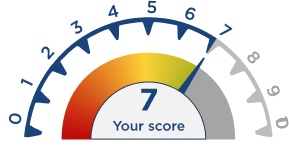What is Term Insurance for Self-Employed Individuals?
It is a type of life insurance policy providing coverage for a specified period to self-employed individuals. This type of policy offers a death benefit payout to the beneficiaries if the insured passes away during the policy term. This makes term insurance for self-employed individuals a cost-effective option, especially for those who may not have a steady income. The primary purpose is to ensure that the policyholder's dependents are financially secure, even in the absence of the policyholder. Those who want a cash value component to their policy can opt for a term plan with a maturity benefit. With this type of plan, the insured receives the survival benefits if they outlive the policy term.
To make your planning easier and more effective, you can use tools like an online term plan calculator. This can allow you to select term plans based on your fluctuating cash flow and ensure the premiums are affordable through different phases of your career.
Importance of Term Insurance for Self-Employed Individuals
Some of the key reasons why term insurance for self-employed people is essential are:
1. Financial protection for the family
Term insurance ensures your family remains financially stable even if you are no longer there to provide for them. This is especially crucial for self-employed individuals who do not have employer-provided life insurance benefits. The payout from the term plan can help your loved ones take care of their needs in your absence. Ensure that your loved ones are aware of how to claim term insurance after the death of the insured person.
2. Cost-effective premiums
Term insurance policies typically have lower premiums compared to whole life insurance plans. It is a cost-effective option for those who are self-employed and may have a fluctuating income. Plus, the sooner you buy, the more affordable it can be for you. If you are in your 30s and healthy, you could avail a term insurance for ₹1 crore plan at a surprisingly affordable rate.
3. Coverage for business debts
People setting up their own businesses may have business-related liabilities, such as loans. Freelancers may have personal liabilities. Term insurance for the self-employed can provide coverage that helps repay these debts, ensuring that their family is not burdened with their financial obligations. If you have high debts, it is advisable to opt for a higher coverage, such as a ₹2 crore term insurance plan.
4. Lesser worries about the future
Knowing that your loved ones will be taken care of in case of your untimely demise can provide immense peace of mind. It is particularly important for self-employed individuals who may face more financial uncertainties.
5. Flexible coverage options
Term insurance plans offer various coverage options, allowing self-employed individuals to choose a policy fitting their specific needs. Depending on your lifestyle and needs, you may choose a suitable sum assured, such as ₹1 crore term insurance or a ₹2 crore term insurance plan if you are looking to support your child’s education. You can opt for more if you also want to help them pursue their career dreams as well.
Additionally, you can opt for riders to increase the coverage of your policy. Many online term plan providers offer optional riders like critical illness or accidental death benefit, which can be added based on your profession and risk profile.
6. Tax efficiency
With term insurance for the self-employed, you can enjoy Section 80C benefits, where you can claim deductions of up to ₹1.5 lakh per annum on premiums paid. In addition, the maturity or death benefits from term insurance are generally exempt from tax under Section 10(10D) of the Income Tax Act, as long as the terms and conditions are met. This dual benefit can help you reduce your taxable income while also securing your loved ones’ future.
Looking for a term life insurance plan with a high sum assured? Click here to know about our ₹2 crore term insurance plans and more.
How Does Term Insurance for the Self-Employed Work?
Term insurance for the self-employed acts as a safety net that ensures financial support for their families and businesses in case of an untimely demise. Here’s how it works in a usual scenario:
You start by choosing a policy term (for example, 20 or 30 years) and a sum assured, like ₹1 crore or ₹2 crore term insurance. Based on your age, health, and income, the insurer calculates a premium, which is usually lower if you apply early. Many providers also offer online term plans these days. You can compare and purchase the policy digitally if you wish to.
Once the policy is active, you are covered for the selected term. If you pass away during the policy period, your nominee will receive the death benefit. This amount can help them cover personal expenses, pay off business loans, or manage day-to-day finances. If you have opted for a term plan with a maturity benefit, and you survive the term, the insurer returns all your premiums. This allows you to enjoy a savings component alongside protection.
As a self-employed individual, your premium and coverage may be influenced by the nature of your work, lifestyle habits, and income. That is why submitting accurate paperwork, especially income proofs, is crucial. Missing or incorrect information is one of the major reasons for term insurance claim rejection, so remember to ensure transparency.
Overall, term insurance for the self-employed offers a flexible, affordable, and efficient way for the self-employed to safeguard their financial responsibilities, both personal and professional. It not only protects your loved ones but also gives you peace of mind to focus on building your business.
Key Features of Term Insurance for Self-Employed Individual?
When you buy term insurance as a self-employed person, you can make the most of the following features:
1. Customisable plans
Many term insurance plans for self-employed individuals offers customisable options. This means policyholders can tailor their coverage according to their needs and financial situation. You can choose your sum assured based on your liabilities, whether it is term insurance for ₹1 crore to protect your family, or a ₹2 crore term insurance to cover business loans, children’s education, legacy planning, and more.
2. High coverage at a low cost
Term insurance policies often provide high coverage amounts at relatively low premiums, especially if bought early on in life. It is an attractive option for individuals seeking substantial protection without a heavy financial burden. Even with rising health risks, many online term plan providers offer affordable policies suitable for the fluctuating incomes of the self-employed.
3. Flexible premium payment
Nowadays, term insurance comes with flexible premium payment options. You can choose when you wish to pay the premium: monthly, quarterly, half-yearly, and yearly. This can be beneficial for self-employed individuals who have irregular incomes.
4. Tax benefits**
Premiums are eligible for deductions under Section 80C, and death as well as maturity benefits are usually tax-free under Section 10(10D). If you choose a term plan with a maturity benefit, the premiums returned at policy maturity (if no claim is made) also qualify for exemption, subject to several terms and conditions.
5. Riders and add-ons
Term insurance for the self-employed typically offer various riders, such as critical illness riders or accidental death benefit riders, which can enhance the coverage for self-employed individuals. For instance, if you are ever diagnosed with a life-threatening illness, you can rely on a critical illness rider to financially support you during such a situation.
6. Easy and Convenient Coverage
Term insurance is a relatively simple product. You pay premiums in return for life cover for a specified period. What’s more, with the rise of online term plans, buying, managing, and renewing your policy is even more seamless and convenient. Just a few clicks and your policy will be ready!
Types of Term Insurance Plans for Self-employed Individuals
There are a variety of term insurance options available in India. While their availability may vary across insurance providers, it is crucial for customers to understand these types to be able to make an informed choice.
1. Level Term Insurance
This is the most common type of term insurance where the sum assured remains constant throughout the policy term. For self-employed professionals with a stable income, a level term insurance plan can be a solid go-to choice, especially if they are looking for a high coverage plan, like term insurance for ₹1 crore at affordable premiums.
2. Increasing Term Insurance
In this type of term insurance for self-employed people, the sum assured increases over time, usually at a predetermined rate. An increasing term insurance plan is suitable for individuals who anticipate a rise in financial responsibilities as their business grows. It is also useful for those who expect their financial commitments to expand over time, leading to a higher life cover to sustain them.
3. Decreasing Term Insurance
This type of online term plan can be ideal for individuals with decreasing liabilities, such as a mortgage. The sum assured gets lower over time in a decreasing term insurance plan, aligning with the reducing debt. It is a cost-effective option for self-employed individuals with significant loans.
4. Return of Premium Term Insurance
Under this plan, the premiums paid during the tenure are returned to the policyholder if they outlive the policy term. For this reason, it is also called a term plan with a maturity benefit. A return-of-premium term insurance policy can be a good option for self-employed individuals looking for a balance between life coverage and savings.
How to Select the Right Term Insurance for Self-Employed Individuals?
Here’s a breakdown of how to choose the best online term insurance plan for self-employed individuals:
Step 1. Assess your financial needs
Determine the amount of coverage you need based on your financial responsibilities, including dependents, loans, and future expenses. Do you want to cover a loan, ensure your child’s higher education, or both, in your absence? Choosing the right coverage starts with these questions.
Step 2. Use a term insurance calculator
Use online term insurance calculators to estimate the ideal coverage amount and premium, based on your income and financial goals.
Step 3. Compare policies
Compare different online term plans to find one that offers the right balance of coverage, premium, and additional benefits such as riders.
Step 4. Check the insurer’s reputation
Ensure that the insurer you choose has a good claim settlement ratio and a strong financial standing. Read up on the eligibility criteria and the documents required for term insurance from the insurer you finalise.
Step 5. Consider the policy term and the premium payment term
Choose a policy term that aligns with your financial goals, such as covering a specific debt or ensuring your children’s education or / wedding costs, your spouse’s retirement plans, etc. In addition, also choose a premium payment term that is in line with your income flow.
Step 6. Add riders if required
If you feel that your lifestyle or occupation is such that riders such as a critical illness rider or a waiver of premium rider may come in handy, it is advisable to add them to your online term plan.
The right term insurance plan should offer adequate coverage without requiring you to break the bank. Use our easy-to-navigate term insurance calculator to quickly estimate your premium with no hassle.
Documents Required to Buy Term Insurance for Self-employed Individuals
Below is an indicative list of documents required for term insurance for the self-employed.:-
Document Type
| Examples
|
Proof of Identity
| PAN Card, Aadhar Card, Passport
|
Proof of Address
| Utility bills, Aadhar Card, Passport
|
Proof of Income
| Income tax returns, Bank statements
|
Business Proof
| Business registration certificate, GST certificate
|
Age Proof
| Birth certificate, Passport, Aadhar Card
|
Health Documents (if applicable)
| Diagnostic test reports showing your past and current medical conditions
|
The above list is not exhaustive. The list of documents required for term insurance may vary across insurers.
How to Claim Term Insurance After the Insured’s Demise?
It is important that the nominee is aware of how to claim term insurance after the death of the insured. Here’s what they should know.:
Step 1. Inform the insurer immediately. Provide them with the death certificate and policy number to initiate the process.
Step 2. Submit the documents required for term insurance claims, such as ID proofs, the original policy document, the claim form, and so on.
Step 3. Wait for the review of the claim as the insurer assesses the request. Make sure you and your nominee are aware of the common term insurance claim rejection reasons like false health history, so as to avoid them and ensure smooth claim processing.
As soon as you buy the policy and choose the nominee, make sure they know how to claim term insurance after the death of the insured and where the documents are stored.
Frequently Asked Questions (FAQs)
Understanding Term Insurance
1. Can term insurance cover business debts for self-employed individuals?
Yes, term insurance for the self-employed can be used to cover business debts and ensure that your family is not burdened with financial liabilities in your absence.
2. Is it mandatory to get a medical check-up to get term insurance for the self-employed?
Some insurers may mandate a health check-up and base the cost of the plan on the results. Health reports give the insurer an accurate idea of any health risks the individual may have. You can opt for a term plan that does not require a medical check-up. However, chances are such plans may offer a lesser cover. Regardless, it is best to avoid misrepresenting your medical history or current condition to the insurer as it is one of the common reasons for term insurance claim rejection.
3. Can self-employed individuals’ avail of tax benefits with term insurance?
Yes, term insurance for self-employed individuals allows them to avail of tax benefits under Section 80C and Section 10 (10D) of the Income Tax Act provided they meet the terms and conditions.
Policy Purchase
4. How do I apply for a term insurance plan for self-employed people?
You can purchase term insurance for the self-employed online or through an insurance agent by providing necessary documents such as proof of income, identity, and business registration.
5. How much will term insurance cost me as a self-employed individual?
The cost of term insurance for self-employed people depends on factors such as the sum assured, policy term, age, health, and the type of plan selected.
6. What is the minimum income requirement to purchase term insurance of ₹1.5 crore?
The minimum income requirement varies depending on the insurer. Generally, an annual income of at least ₹6-7 lakh is required to purchase ₹1.5 crore term insurance for the self-employed.
** Tax exemptions are as per applicable tax laws from time to time.



























